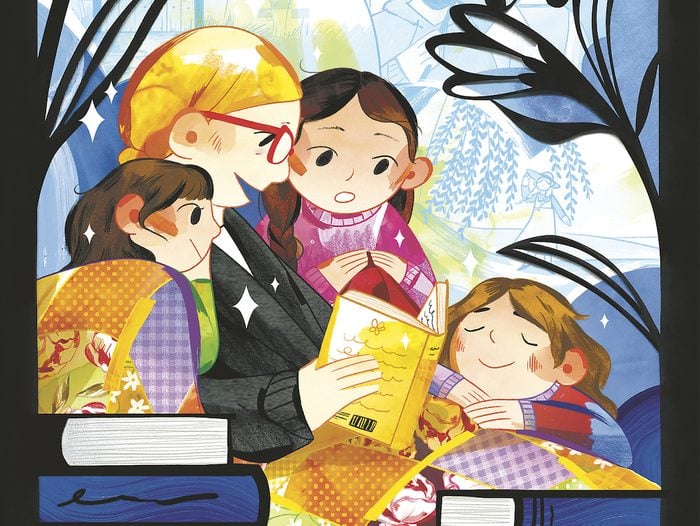After My Cancer Diagnosis, I Began Reading to My Daughters

I knew I had a terminal illness and I wanted my three daughters to remember me in the many books we read together.
When I was first diagnosed with Stage 4 breast cancer in 2015, one of my biggest fears—aside from the obvious one of dying—was that there were so many books I would miss out on reading to my three young girls. When you have a terminal illness, there is a lot of talk about leaving a legacy. Some people write letters to their children. Some record videos. The only legacy that felt right for me to leave was a literary one: a shared love of books that we have read together.
With a disease like mine, you never know how things are going to go. I enjoyed two years of relative stability before the cancer spread again. It has always been in my ribs and back, but now it has reached my hips, legs, uterus and possibly other places; at this point, it is hard to keep up. I can break ribs when I sneeze, or if I sleep in the wrong position—both things that have actually happened. For all of last year, I walked with a cane and needed a wheelchair for any distance further than up the stairs to my bed.
In my mind, I am still a young woman. But at 44, my body feels so much older—and the thought of leaving behind my husband and my three children, ages 12, 10 and seven, is terrifying. I want to make every moment, even moments spent reading, count.
The first book
I was already a huge fan of the Harry Potter series when I was diagnosed, so that was at the top of my list. These books got me through a dark time in my 20s and hold a special place in my heart. During the winter of my diagnosis, while I was going through chemotherapy for the first time, I started my oldest, who was turning eight, on her Harry Potter journey. My other daughters were then five and two, so they were too young to start just yet. I kept thinking, Just let me live long enough to read all the books to my girls.
From there, I made a list of other books I wanted us to share. Reading together has always been our thing. I was never a mom who wanted to get on the floor and play; I was always more interested in sitting us down and reading. My girls knew that I would usually drop everything if they asked me to read to them. I remember asking my oldest daughter years ago if she would still let me read to her even when she was reading chapter books on her own. She is in Grade 7 now. And yes, I still read aloud to her when I get the chance.
Anne of Green Gables was second on my list. I tend to gravitate toward the classics, and reading the entire Anne series is such an enjoyable way to learn about growing up as a smart, determined girl.
The Little House on the Prairie series came next, even though I hadn’t read it as a kid. I have since read the entire series through at least five times to my daughters. While there are definitely parts of the books that are worth criticizing today—like their portrayal of Indigenous peoples—I like the discussions they create in our family. For a while, a lot of conversations in our house would start with: “What would Ma or Pa Ingalls do?”
Other books on my list have included A Little Princess, A Wrinkle in Time, The Secret Garden, The Dark Is Rising series, Little Women, Pride and Prejudice and Jane Eyre. I have now read most of these to at least one of my daughters. Many more new-to-me and modern books have been added to the list, too. The Graveyard Book by Neil Gaiman and The Swallow by Charis Cotter sparked discussions about ghosts and death. One Crazy Summer by Rita Williams-Garcia taught us about the civil rights movement in 1968 Oakland, California. There is more diversity in these modern books, so while I like the classics, I try to not limit myself to them. We are all learning together.
My 12-year-old and I are currently working through a number of historical mystery series: the Maisie Dobbs books by Jacqueline Winspear and the Lane Winslow mysteries by Iona Whishaw. These two series feature strong, smart women who made it through two world wars and now solve mysteries. It’s fun having someone in the family who enjoys these more mature books. I’m glad I have lived long enough to move away from children’s books and that I am still here to expand our literary experiences.
The list grows
As the girls get older, the list of things I want to share with them has changed to include music and movies. Each child is so different that what they want me to share and what makes sense to share with them is different, too. My youngest is the one who would not have remembered me had I died when first diagnosed. She’s now seven-and-a-half. To her, I have passed down my love of musicals. She can spend the day complaining that the kids in her class are too loud—even with her noise-cancelling headphones—then come home and turn Hamilton on at full volume in her bedroom.
“Mom, when you are a grandma, will you teach my kids about Harry Potter?” my middle girl recently asked me. I didn’t really answer. I said I would like to, but I know she understands on some level that the chances of me being around then are pretty slim, and I refuse to lie. I wish I could say yes and know that I will meet these imagined grandchildren someday, but I can’t. It’s hard. I’m grateful that they all share my love of Harry Potter and even more grateful that, this summer, I finished reading the last book to my youngest daughter. Some days, I didn’t think I would be around long enough to achieve this goal. Doing so felt momentous.
You think when you have children that you have all this time with them, but it isn’t necessarily true. My fear is that all they are going to remember about me is how my illness coloured their childhood with the looming threat of death. They have all but resigned themselves to the fact that I’m not much fun. Some days all I can do is get out of bed and feed them lunch, while other mothers are out attending Terry Fox runs and volunteering at the school.
But books are something I know, and reading is something we can do together; even on my worst days, we can snuggle up and read something. As Sirius Black says in the film version of Harry Potter and the Prisoner of Azkaban: “The ones who love us never really leave us. You can always find them, in here.” Sirius points to Harry’s heart when he is saying this, but I believe that the ones who love us can also be found in the pages of a book long after they are gone. At least that is what I hope for my girls.
Read about how this Ontario doctor helps breast cancer patients prepare for treatment.
© 2019, Melanie Masterson. From “Leaving a literary legacy: In wake of my cancer diagnosis, I decided to read to my daughters,” from This Magazine (December 2019), this.org






